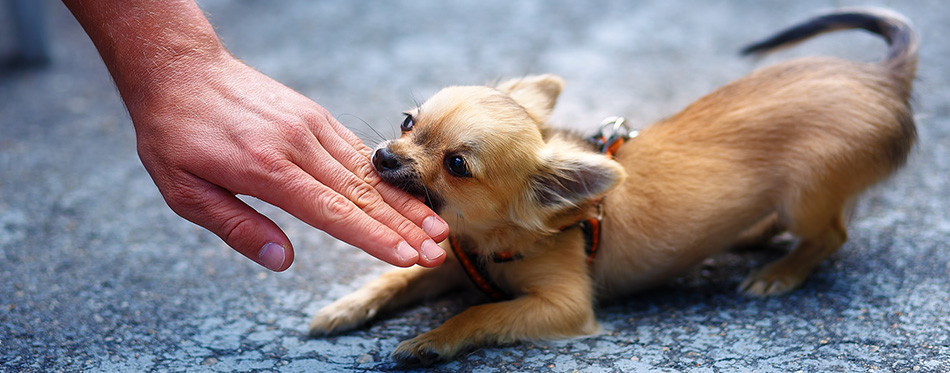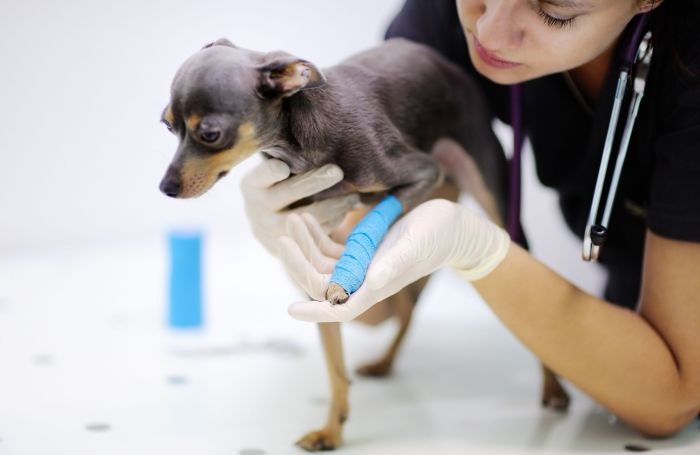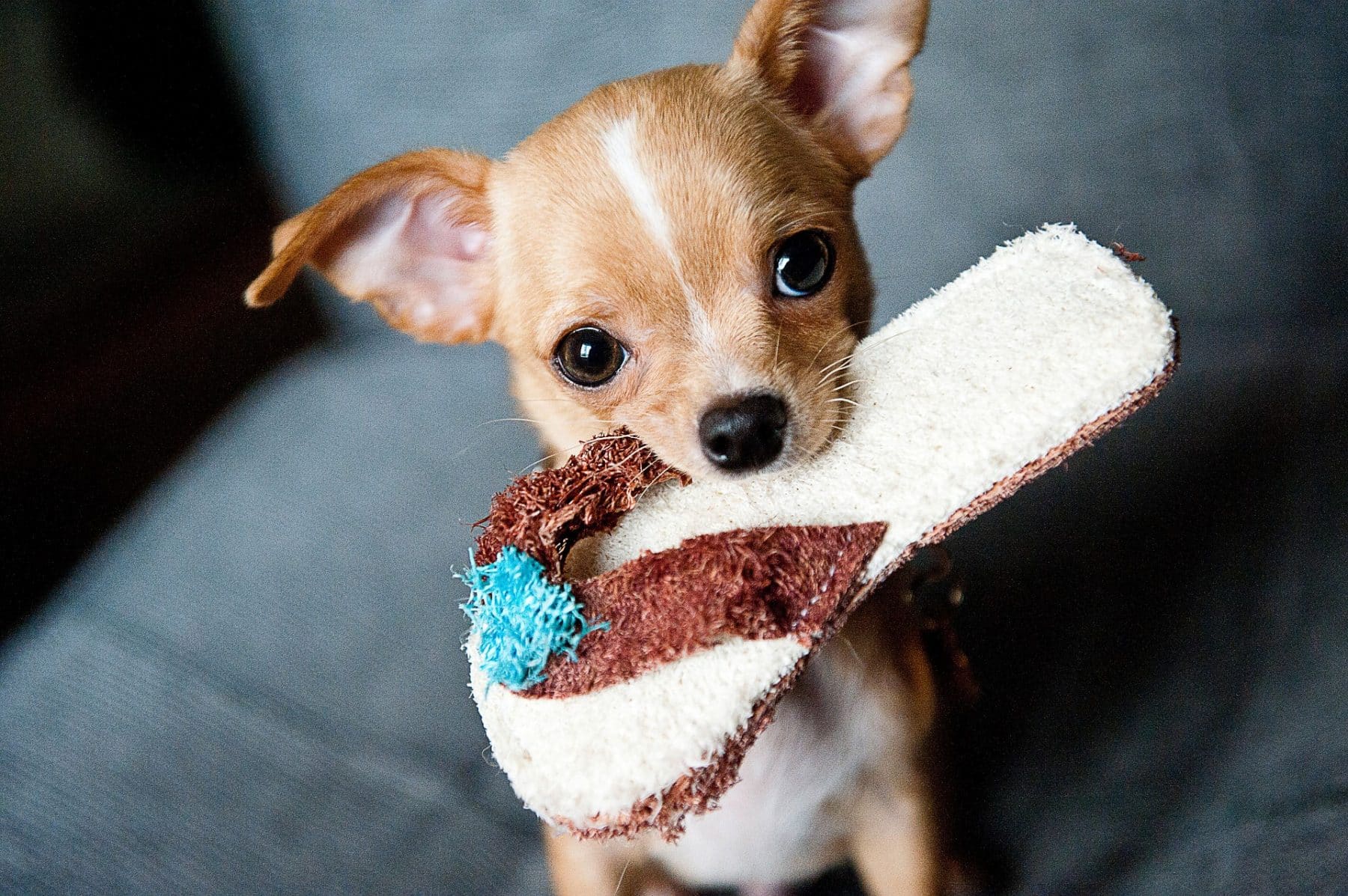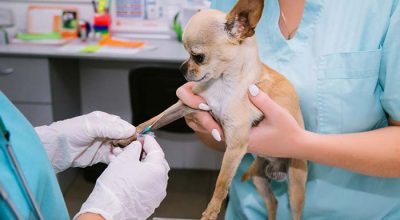Many of the behavioral issues that exhibit beginning at a very young age, is your pet Chihuahua Biting Aggression! In addition, the likelihood of these issues persisting well into adulthood is relatively high, as previously stated.
In the first place, most Chihuahua owners are unaware that the vast majority of bites begin with an object being drop to the ground. If the dog doesn’t bite the person who fell the thing, there’s no reason for it not to. Unfortunately, the owner was not present when the object was drop.
Because they are typically small dogs, they will not bite down far enough to feel the bone or damage the muscles. Instead, they pull, which may cause the owner to be startle or startled by the situation. This is what ultimately results in the person bite.
Also Read: How To Tame An Aggressive Chihuahua: What You Need To Know
When the bites are severe enough, they can even extend to the face, causing broken skin. If the dog’s mouth is devoid of teeth, it will be unable to bite deeply enough to cause injury to the bones. Although most dogs can tell the difference between a toy and a person when they bite, they are also dangerous to other people when they do bite someone.
Chihuahua biting aggression is not something to take lightly. It is dangerous. Their spaying or neutering should done at the earliest opportunity, if not sooner. Unfortunately, because most dog bites occur while petting dogs, many owners cannot prevent them. For the dog to train appropriately to bite instead of biting when threatened, it must be allowed to do so.
Your Chihuahua will likely begin to nip at other dogs as it grows older if you have more than one of the breed in your home. This breed is known for its aggression, and it is very likely to bite someone if given the opportunity.

What Causes Dogs to Show Aggression?
Understanding why your dog is acting aggressively is critical to devising the most effective strategy for ending this threatening behavior. There are a diversity of factors that can contribute to canine aggression.
🦴 Illnesses and accidents
Some medical circumstances can cause dogs to become aggressive. These include: The sudden onset of growling, snapping, orbiting in a dog who has previously displayed no signs of aggression could be the result of a disease or illness.
When it comes to dogs, pain is a prevalent source of aggression.
Your suddenly aggressive dog may be suffering from an injury or illness that is causing him significant discomfort and stress. Arthritis, bone fractures, various tumors, internal injuries, and lacerations are just a few of the conditions that can result in pain.
Other illnesses can affect your dog’s brain, causing him to behave unreasonably. Aggression can trigger by various conditions, including cognitive dysfunction, brain diseases, and brain tumors. These issues are more likely to arise in older dogs, but they can occur at any age in a dog’s life.
Consult with your veterinarian before attempting to correct your dog’s sudden and unexplained aggression.
You may tempt to administer pain medication to your dog to alleviate his discomfort, but this is not a good idea. If your dog is sick, you’ll require to figure out precisely what’s wrong with it before you can start treating it appropriately. Never dealt with taking matters into your own hands until you clearly understand what you’re up against. Veterinarians are the only ones who can counsel you on which medications are appropriate for your dog.
🦴 Fear
A fearful dog can quickly become aggressive as a result of his fear.
The majority of dogs will only engage in aggressive behavior if they believe they are in danger, are unable to flee, and feel the need to defend their lives. For example, if a dog is back into a corner with no way out, or if he believes a hand raise above his head means he is about to be hit, this may occur.
Suppose chihuahua a rescue dog exhibits fearful or aggressive behavior further frequently than is typical. In that case, it be able to have abuse, neglect, or subjected to a traumatic event, or it be able to have Improperly socialized as a puppy. If your dog is not a rescue dog, it be able to have abuse, neglect, or subject to a traumatic event. Any information you can obtain from the organization from which you adopted the dog may help establish the finest course of action to take in this situation.
Also Read: Do Chihuahuas Have Separation Anxiety?
The training of rescue dogs with an instructor specializing in teaching dogs who have abuse or not been properly socialized may be required at certain times. You may be able to handle your dog’s fear on your own with training and patience in some situations. You should consult with a veterinarian to specify the best course of movement.
To prevent this aggressive behavior in unfamiliar dogs, approach them cautiously (better yet, let them come you). Train and socialize your dog early on to help prevent fear later on in life.
🦴 Possessiveness
Possession aggression, also known as resource guarding, occurs when a dog becomes overly attached to something. This is frequently in the form of food, toys, or some other valuable item. When someone approaches his food bowl or gets too close to him while chewing a favorite toy, a dog who exhibits possession aggression may growl in response.
Unknown people who come into your home, the dog’s territory, may also bite by your canine companion.
The level of aggression can differ from one dog to another as well as between different objects. Your dog cannot care if you sit down and pet him while he chews a rubber toy, but if you do the same thing while he chews a pig’s ear, he may turn and snooze at you. This is because pigs’ ears are poisonous to dogs. It all relies on the value that the dog assigns to each object or resource in their environment.
🦴 Demonstration of Dominance
Dogs can be hostile as a means of asserting their dominance over their owners.
This is most often direct at other dogs, but it can also occur with people on the other side.
It’s critical to remember that dominance is a behavior, not a characteristic of a person’s personality. Dogs are not naturally dominant or submissive in their behavior. Some people may have a predisposition to one type of behavior over another, but this is usually resolute by the context in which they find themselves.
Dogs who exhibit dominant behavior believe that they must demonstrate that they are in command of a situation. This type of behavior occurs when they feel their position is challenge by another person.
Unfortunately, many people believe that canine aggression is cause by dominance-related behavior when, in fact, there may another underlying cause. According to research, aggressive and dominant behavior is not nearly as prevalent in everyday life as the factors of aggression.
🦴 Frustration
Redirect aggression, also known as barrier frustration, is a type of aggression trigger by frustration. It occurs when a dog becomes frustrated at not being able to reach something and decides to vent their frustration in another manner. 5 A common occurrence in dogs that spend a significant amount of time tied up, restrained on a leash, or enclosed behind a chain-link fence is this type of aggression.
In some cases, a dog chained in a yard may spend the entire day attempting to reach a dog that lives across the street or in an adjacent yard. When a dog is restrain, they usually bark and growl more vehemently as the frustration builds. When the owner approaches, the dog may lash out in frustration and bite the coming person.
Make sure you don’t misinterpret your dog’s aggressive behavior. Before assuming that you know what is causing your dog’s aggressive behavior, make sure you have ruled out any health issues or fears. Any attempts at corrective action would, in this case, only serve to exacerbate the situation.
What is the perfect way to keep a Chihuahua from biting?

You can prevent your Chihuahua from biting by employing some of the most simple and effective methods described further below. It is critical to teach them not to bite to avoid injuring you, your family, and those in their immediate vicinity. Educate them to only chew on appropriate objects, such as their toys, bones, and food, and avoid other things altogether.
When your puppy is behaving appropriately, make sure to give him plenty of verbal praise and positive reinforcement. It is good to exercise hand-feeding them some treats, as this will teach them how much strain and force to apply when they are near human hands. Their jaws will also become more controlled as a result of this.
🐾 Method 1: Verbal commands are used.
Puppies will inevitably bite by their littermates when they are playing with them. This is a natural part of young puppy play and socialization, and it should not take seriously at this point in the puppy’s development. However, you will notice that when a puppy is bite, they will make a yelping squeal as if they have bite. Biting will stop as soon as the biter realizes that it is time to back away.
To discourage your puppy from biting, you can imitate this squeal. Bite inhibition is a technique that is widely use by dog trainers and is highly recommended by them. You can also use firm verbal commands, for instance, “stop” or “no,” to communicate your intentions due to the puppy’s belief that you are injured because the puppy will retreat.
After this sound has been made, your dog will instinctively look for some form of reassurance but hold for a minute or two before doing so. We recommend that you turn away from them for a brief period to drive the point home.
🐾 Method 2: Refrain from using corporal punishment.
Although many people no longer hit their dogs when they do something wrong, others do. This is somewhat we do not recommend at all.
Physical violence is never an effective means of achieving a goal and will only cause harm and fear to your puppy. They may bite even more as a result of the stress and confusion.
🐾 Method 3: Don’t treat it as if it were a game.
If your puppy nips you, do not begin playing with them right away. Pushing them out gently and playfully makes the biting appear like a game, increasing the likelihood that your puppy will continue to bite you.
Young dogs adore playing with humans and will take advantage of any opportunity that comes their way. Once your puppy begins to nip you, we recommend that you take firm control of the situation and refuse to interact with him.
🐾 Method 4: Obtain some chew toys.
Being bitten will be less of an issue when you first get your puppy because they will not have large teeth at that time. Because there is no actual pain when you play with them with your hands, it is tempting to do so. When their adult teeth begin to erupt, this will cause problems later on in life.
In the early stages of the puppy’s life, you are socializing him to believe that human hands are good playthings, which is a good thing. We recommend that you purchase some chew toys and use them as playthings for your dog. Hands are off-limits, and only certain circumstances can be bitten due to this behavior modification technique.
Positive associations are formed in their brains as a result of concentrating their attention on a chew toy. As your puppy develops into an adult canine companion, you will have far fewer problems by laying the groundwork for these concepts early.
🐾 Method 5: Instruct them to allow their hands to come close to their mouth.
Your Chihuahua must be socialized to handling hands that are close to their faces and their mouths. This will be a common occurrence in their lives, and they must become acclimated to it. Taking foreign objects out of their mouths will be necessary if they eat something they are not supposed to. You will be required to check the health of their gums and teeth, and they must not bite you at any point.
There are some approaches you can take, but the most effective is to use a small treat. Hold it among your index and middle fingers and show it to the puppy. Place the pleasure into their mouth gently while holding it in your hand. Then take it out of their mouth. This must be done many times a day. It will take some time for your dog to become accustomed to having your fingers in their mouth and will no longer feel the need to bite you.
🐾 Method 6: Instruct them to refrain from fighting over food.
Dog puppies are highly protective of their food, which is something they learned from their littermates. If your Chihuahua grumbles at you when you move their food bowl, they are not happy. This is a trouble that needs to be addressed immediately.
Position the food bowl in front of your puppy for a few moments before removing it. If they growl or bite, tell them “no” loudly and firmly while holding on to the bowl. If they do not respond, lavish them with praise and a tasty treat. Continue this procedure until your puppy shows no signs of distress.
🐾 Method 7: Incorporate sour tastes.
This is similar to the concept of nail polish, which is designed to discourage people from biting their nails. To use this method, you will need to wear gloves. Bitter spray used with dogs (such as this) should be sprayed onto the glove before use.
As soon as the dog bites your glove, they will be able to detect the spray. They will be displeased and will leave as quickly as possible. The taste will become more associated with biting, and eventually, they will stop doing it altogether.
🐾 Method 8: Demonstrate your dominance
In addition to the reasons we previously mentioned, dogs bite to assert their dominance over you and other animals. Another reason for biting is jealousy, which can manifest itself in the form of a tantrum in a small child. In both cases, demonstrating to your dog that you are the Alpha will resolve the situation.
Because you are the Alpha, you command a high level of respect from your peers because you are the pack’s leader. Lower-ranking members of the crew will not bite the Alpha. To maintain this position, you must be firm and assertive with your dog. Make sure to recognize and reward any positive behavior as well.
🐾 Method 9: Allow your Chihuahua to socialize with other dogs.
Dogs are naturally packed animals, and they require a certain amount of socialization to live healthy and happy lives. The behavior of their peers will also serve as a source of learning for them. This will enable them to distinguish between acceptable behaviors and those that are not.
Expectantly, their friends will not bite anyone, and this will assist your puppy in realizing this as well as possible. If nothing more, playing with their friends will exhaust your puppy’s energy reserves, reducing the likelihood that they will bite you.
🐾 Method 10: Prepare your puppy to become acclimated to loud noises.
Throughout your Chihuahua’s life, there will be numerous occasions when they are exposed to loud noises, crowded areas, and other potentially frightening situations. These can cause your puppy to become fearful and stressed as a result of them. It is during these types of problems that dogs are most prone to biting.
By gradually exposing your puppy to situations like these from a young age, you can reduce the likelihood of them becoming fearful of them. In turn, this will reduce their propensity to lash out and bite when they are in unfamiliar surroundings.
When introducing your puppy to new situations, you must keep them on a leash at all times. You have not been concerned about how they will react as a result of their fear. They may bite or, in the worst-case scenario, flee and become lost. If you are hesitant about whether or not they will panic, do not let them off the leash until you are confident.
🐾 Method No. 11: Keep an eye on things!
Monitoring and supervising your Chihuahua’s behavior is one of the most effective ways to keep them from biting others. This is especially essential when young children are present, as they are less proficient at picking up on warning signs and discernible cues from your dog than an adult would be.
A dog’s bite on a young child can have severe consequences for both the child and the dog. It may be possible for the parents to make a case for the euthanasia of their dog in extreme circumstances.
While Chihuahua bites are rarely fatal, they can be highly distressing for everyone who is bitten. Keeping an eye on your dog and any children who may be in the vicinity should be sufficient to prevent anyone from being attacked by it. It is easy for young children who are just learning to walk to be knocked down by an excitable dog, frightening them.
In addition, happy and excited dogs tend to lunge at people’s faces, which can be frightening to young children, mainly if they are not used to being around animals.
🐾 Method 12: Pinch the inside of their chin
This is not our preferred method because it causes the puppy to be uncomfortably restrained. We just suggest this while a final resort when dealing with puppies who are biting consistently. When your dog is about to prick you, create a noisy squealing and insert the thumb inside the dog’s mouth to distract them. It should be placed below dog’s tongue, your fingers should be placed underneath their chin. Squeeze gently for 10 seconds to release the tension.
When must you search professional assistance?

We recommend that you seek professional assistance if you have tried all of the above methods and cannot stop your Chihuahua from biting. Please talk with a veterinarian as soon as possible. They will perform a comprehensive health examination on your dog to ensure that the biting does not result from a health problem such as teething or an injury to the mouth.
Consider the fact that your dog may be teething for up to 8 months when determining the severity of the biting problem.
Suppose they determine that the biting results from a purely behavioral issue. They will most likely recommend you consult with an animal behaviorist. They can be found in large numbers in many parts of the world, and many of them are dedicated to the treatment of fear, aggression, and biting in Chihuahuas in particular.
Your vet can administer ultrasound tests to confirm the pregnancy 25 days after mating. The vet may also administer blood tests after five weeks for confirmation. According to vets, however, the ultrasound is your best option for confirmation. Like in human pregnancies, the doctor will be able to see the baby’s current state through ultrasounds.
Frequently Asked Question
Q: What causes Chihuahuas to become so aggressive?
A: Chihuahuas are aggressive because they are fiercely protective of their territory. They have no qualms about confronting anyone who comes too close to their environment. If they are older than a year, it will take them some time to make friends with other people. Owners and friends must work hard to earn their pet’s trust over time.
Q: Do Chihuahua bites cause discomfort?
A: Most Chihuahuas will bite you with a slight nip when they are scared, but they will not bite you hard enough to cut you. However, if the Chihuahua is older and more aggressive, the bite could be excruciating, especially if the victim is a small child.
Q: What is it about my Chihuahua that makes her bite me?
A: The pain-induced aggression or the maternal aggression of your Chihuahua may also lead to biting from your dog. Whenever your Chihuahua is in pain, she may become more aggressive than usual, and she may bite the first person or animal she comes across. If your dog exhibits maternal aggression, its hormones may be the source of the charge.
Q: Do Chihuahuas have the most biting teeth?
A: Lakewood, Colorado (AP) — Chihuahuas are the dogs that are most likely to bite veterinarians, Lhasa Apsos are the dogs that deliver the most severe bites, and mixed breed dogs account for approximately 40% of all dog bites. These and other dog-bite truths are revealed in a new study that has been in the works for two years and looks into what types of dogs bite and why they do so.
Q: What has caused my Chihuahua to become hostile toward me suddenly?
A: Chihuahuas are adorable little dogs, but they are still dogs, no matter how cute they are. Due to their tiny size, chihuahuas are prone to acting aggressively for the same reasons any dog might act aggressively: anxiety, territorial behavior, or the desire to assert dominance.
Final Thoughts
Above all, keep in mind that Chihuahuas are brilliant little dogs; if you’re consistent with your training and make sure your pup understands who’s in charge, he’ll quickly learn which behaviors are acceptable and which are not.
Dogs, like children, are sensitive to the tone of your voice and will respond accordingly. When correcting your dog’s behavior, refrain from yelling at him; this will only make him fear you and bite more frequently in response.
A professional dog trainer may be able to provide you with advice about your specific situation if you are highly dissatisfied with your pup’s behavior. Training early and frequently is the key to having a well-adjusted pet in the future.

Here at ILoveChihuahua, we share our personal experiences as owners of this feisty breed. We talk about recommended methods, dog supplies picks, and advice on common Chihuahua problems. Our goal is to promote responsible dog ownership, so there would be fewer Chihuahuas in shelters.


